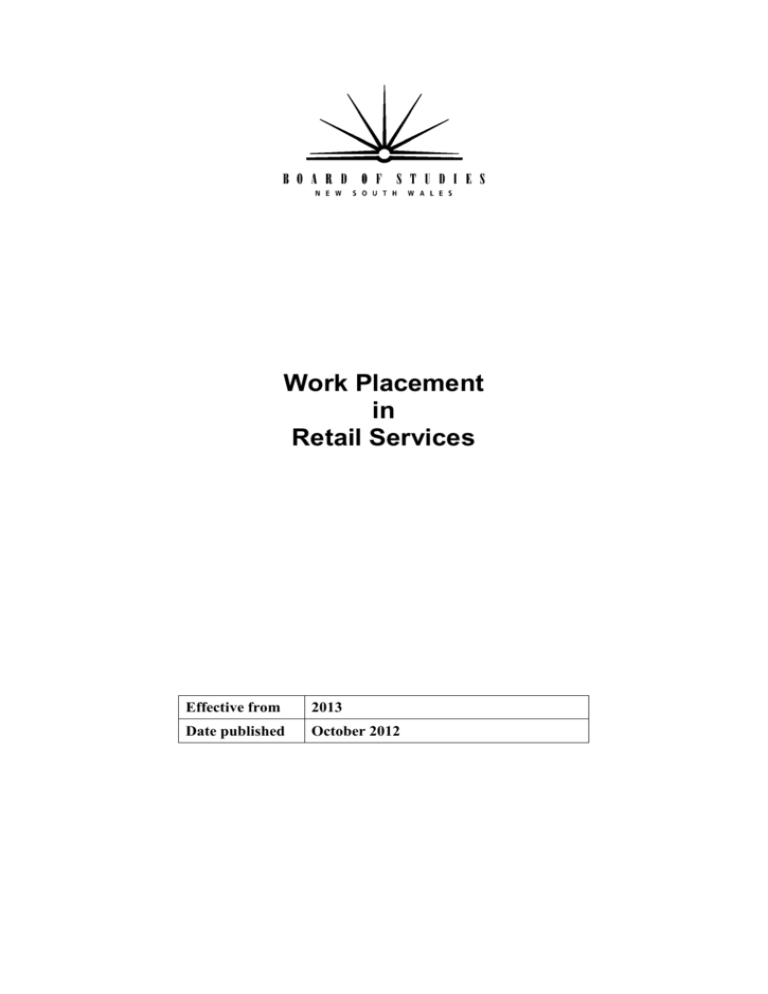
Work Placement
in
Retail Services
Effective from
2013
Date published
October 2012
© 2012 Copyright Board of Studies NSW for and on behalf of the Crown in right of the State of New South Wales.
This document contains Material prepared by the Board of Studies NSW for and on behalf of the State of New South Wales.
The Material is protected by Crown copyright.
All rights reserved. No part of the Material may be reproduced in Australia or in any other country by any process, electronic
or otherwise, in any material form or transmitted to any other person or stored electronically in any form without the prior
written permission of the Board of Studies NSW, except as permitted by the Copyright Act 1968. School students in NSW
and teachers in schools in NSW may copy reasonable portions of the Material for the purposes of bona fide research or
study.
When you access the Material you agree:
•
to use the Material for information purposes only
•
to reproduce a single copy for personal bona fide study use only and not to reproduce any major extract or the entire
Material without the prior permission of the Board of Studies NSW
•
to acknowledge that the Material is provided by the Board of Studies NSW
•
not to make any charge for providing the Material or any part of the Material to another person or in any way make
commercial use of the Material without the prior written consent of the Board of Studies NSW and payment of the
appropriate copyright fee
•
to include this copyright notice in any copy made
•
not to modify the Material or any part of the Material without the express prior written permission of the Board of
Studies NSW.
The Material may contain third-party copyright materials such as photos, diagrams, quotations, cartoons and artworks. These
materials are protected by Australian and international copyright laws and may not be reproduced or transmitted in any
format without the copyright owner’s specific permission. Unauthorised reproduction, transmission or commercial use of
such copyright materials may result in prosecution.
The Board of Studies has made all reasonable attempts to locate owners of third-party copyright material and invites anyone
from whom permission has not been sought to contact the Copyright Officer, ph (02) 9367 8289, fax (02) 9279 1482.
Published by Board of Studies NSW
GPO Box 5300
Sydney 2001
Australia
Tel: (02) 9367 8111
Fax: (02) 9367 8484
Internet: http://www.boardofstudies.nsw.edu.au/
20120807
Work Placement in Retail Services
Contents
Work placement in Retail Services
Work placement requirements
Work placement and part-time work
Work placement implementation
Work placement coordination
Principles underpinning work placement in the Higher School Certificate
Work placement in Retail Services
Work placement is a mandatory HSC requirement within the Retail Services Curriculum
Framework and appropriate hours have been assigned to each HSC VET course within the
Framework.
Learning in the workplace will enable students to:
progress towards the achievement of industry competencies
develop appropriate attitudes towards work
learn a range of behaviours appropriate to the industry
practise and apply skills acquired in the classroom or workshop
develop additional skills and knowledge, including the employability skills (refer to the
Employability Skills in Retail Services document).
Work placement requirements
Students must complete the following work placement for Retail Services Curriculum
Framework courses:
Retail Services Framework course
Minimum work placement requirement
Retail Services (120 indicative hours)
35 hours
Retail Services (240 indicative hours)
70 hours
Community Pharmacy Specialisation Study
(60 indicative hours)
Community Pharmacy Specialisation Study
(120 indicative hours)
no additional hours required
Retail Operations Extension
(60 indicative hours)
Work placement is to be undertaken in an appropriate retail services or community pharmacy
work environment.
3
Work Placement in Retail Services
For units of competency that must be assessed in a retail or community pharmacy work
environment, work placement provides an opportunity to collect evidence required for a
student to be deemed competent.
Students undertaking these courses as part of a school-based traineeship will meet the
mandatory work placement hour requirements through the on-the-job training component of
the traineeship.
Non-completion of work placement is grounds for withholding the HSC course. Schools and
colleges are advised to follow the procedure for issuing ‘N’ determinations as outlined on the
Board’s Assessment Certification Examination (ACE) website.
Work placement and part-time work
Recognition of Prior Learning (RPL) may be granted for mandatory work placement
requirements. Students’ outside employment (ie not under the auspices of the school) may be
recognised towards the requirement for work placement in a VET course (ACE 8051 –
Assessment Certification Examination (ACE) website).
Work placement implementation
The scheduling of work placement should reflect student readiness and complement off-thejob learning programs.
Teachers should use their professional judgement in the selection of relevant work
placements in related industry areas and the mix of retail services-specific and more general
workplace experience undertaken by each student.
Work placement should occur in appropriate workplaces within retail services. For example:
retail outlet
retail fast food outlet
pharmacy
For units of competency that must be assessed in a retail or community pharmacy work
environment, work placement provides an opportunity to collect evidence required for a
student to be deemed competent.
The mandatory work placement requirements for courses in this Framework are not intended
to indicate the time required for the achievement of units of competency. The amount of
learning in the workplace that is needed to achieve a unit of competency will vary.
It is the responsibility of the school or college and/or Registered Training Organisation
(RTOs) to determine how course outcomes are best achieved and to structure delivery
accordingly. If additional work placement or classroom time is required to enable individual
students or class groups to achieve the competencies, this will be determined by the deliverer,
but it does not affect the indicative HSC hours.
Further information and advice on the implementation of work placement are contained in
policy statements or guidelines available from the relevant school system or the RTO.
4
Work Placement in Retail Services
Work placement coordination
It will be essential that RTOs, schools or colleges and work placement brokers work
collaboratively to maximise work placement opportunities to support students’ access to
particular assessment environments, learning experiences and opportunities for the gathering
of evidence for assessment.
Principles underpinning work placement in the Higher School
Certificate
The Board of Studies has formally endorsed the following principles relating to work
placement in Higher School Certificate (HSC) VET courses.
Preamble
Industry curriculum frameworks have been developed to provide students with the
opportunity to gain credit towards the NSW HSC and credit towards national vocational
qualifications under the Australian Qualifications Framework.
Industry curriculum frameworks are derived from national Training Packages. Courses within
the frameworks specify the range of industry-developed units of competency from the
relevant Training Packages that have been identified as suitable for the purposes of the HSC.
VET courses in industry curriculum frameworks are aligned to national vocational
qualifications.
Although not all Training Packages mandate work placement, it is a mandatory HSC
requirement of each course within the frameworks. Indicative hours have been assigned to the
work placement requirement for each course.
The following principles should be read in conjunction with any school system’s
documentation relating to work placement.
Principle 1
Work placement must have a clearly articulated and documented purpose. The structure of
the work-based learning experience needs to be planned and developmental.
A range and number of purposes are possible, including, for example:
learning about a particular industry, workplace culture and career opportunities
practising skills learnt off the job
developing new skills
improving work-related skills
developing skills including employability skills such as teamwork, using technology and
problem-solving
achieving entry-level competencies
achieving workplace performance of particular competency standards
assessing in a realistic environment or allowing for holistic assessment
providing opportunities to build skills in a developmental manner from the simple to the
complex
providing opportunities for the learner to reflect on the workplace learning experience in
the context of individual current knowledge and understanding
encouraging students to undertake further education and training.
5
Work Placement in Retail Services
Principle 2
The scheduling of the work placement should reflect student readiness and should
complement off-the-job learning programs.
The scheduling of the work placement should take account of:
whether or not students are workplace-ready in terms of the competencies they will need
to develop and demonstrate in the workplace
how the timing of the work placement links to overall course planning
the degree of flexibility available at both the workplace and the school
how the alignment of both on- and off-the-job competencies can be best achieved.
An individual work placement program focusing on a developmental approach should be
negotiated with the workplace supervisor/employer. This approach should focus on students
moving from simple to more complex tasks. Dependence on supervision should reduce over
time as students move towards greater independence in the workplace. The ultimate goal of a
work placement should be competence and autonomy in the range of tasks required for the
job being undertaken.
Principle 3
Work placement should be relevant to the VET courses being undertaken.
The ‘real’ tasks being undertaken in the workplace should complement the tasks and learning
being undertaken by the students in their VET courses at school. Work placement may also
provide students with the opportunity of having learning outcomes/units of competency
assessed in the workplace by accredited trainers and assessors.
Principle 4
Work placement can provide opportunities for work-based assessment.
Not all industry curriculum frameworks specify that it is mandatory for competencies to be
assessed in the workplace. Assessment events should relate to overall course planning and the
purpose of the work placement. In a competency-based course, assessment of competencies is
criterion-referenced. This means that a participant’s performance is judged against a
prescribed standard, not against the performance of other participants.
The purpose of assessment is to judge competence on the basis of performance against the
performance criteria set out under each element of competency. A participant is judged either
competent or not yet competent.
Competency-based assessment is based on the requirements of the workplace. Competence
incorporates all aspects of work performance, including problem-solving and the capacity to
apply skills and knowledge in both familiar and new situations. Assessment of competence
involves the assessment of skills and knowledge combined.
Assessors should adopt an integrated or holistic approach to assessment. This means that a
number of elements of competency or even several units of competency are assessed
together. This method of assessment is encouraged in line with the concept of competence as
the integration of a wide range of skills, knowledge and attitudes.
6







